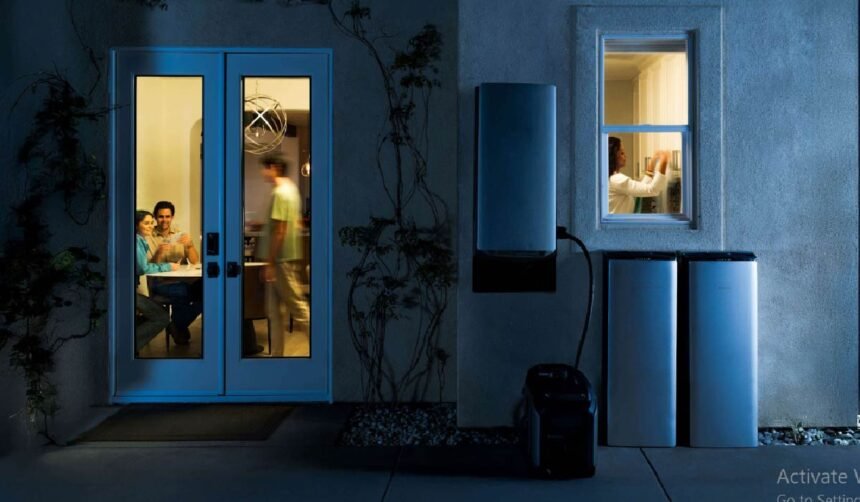Unpredictable weather, aging infrastructure, and rising electricity costs have made reliable energy one of the biggest concerns for households today. More families are looking for solutions that go beyond candles and flashlights when the grid fails. One of the most practical options is a home battery backup, a system designed to store energy and keep critical appliances running during outages.
This article explores how these systems work, the benefits they offer, what to consider before installing one, and how they compare to other backup solutions.
What Is a Home Battery Backup System?
A home battery backup system stores electricity that can be used when the grid goes down. Unlike a traditional generator, it doesn’t rely on gas or propane and operates silently.
Key characteristics:
- Rechargeable: Batteries can be charged from the grid, solar panels, or other renewable sources.
- Automatic switchover: Many systems detect outages and instantly begin supplying power.
- Scalable: Systems can be expanded with additional batteries to match a household’s energy needs.
Why Backup Power Matters in 2025
The importance of backup energy solutions has never been clearer:
- Extreme weather: Heatwaves, snowstorms, and hurricanes cause more frequent and longer blackouts.
- Remote work reliance: Internet, laptops, and routers need stable power to keep productivity high.
- Medical needs: Families with health equipment such as CPAP machines or oxygen concentrators require uninterrupted power.
- Comfort and safety: Heating, cooling, and refrigeration are critical to maintaining safe living conditions.
Benefits of Home Battery Backup
1. Quiet and Emission-Free
Unlike fuel generators, batteries operate silently and produce no fumes, making them safe indoors.
2. Renewable Integration
Batteries can pair with solar panels, storing clean energy for use at night or during outages.
3. Reliability
Systems automatically switch on when an outage occurs, meaning no manual setup during stressful situations.
4. Cost Savings
By storing energy during off-peak hours and using it when rates are higher, some households lower electricity bills.
5. Scalability
Whether you want to power just essentials or your entire home, capacity can be adjusted to your needs.
How Long Can a Home Battery Backup Last?
The duration depends on system size, household energy consumption, and usage during an outage.
- Small systems (5–10 kWh): Enough for lights, Wi-Fi, phones, and small appliances for several hours.
- Medium systems (10–20 kWh): Can support refrigerators, laptops, and basic HVAC for a full day.
- Large systems (20+ kWh): May keep a family-sized home running for multiple days, especially when paired with solar panels.
Comparing Backup Options
| Feature | Home Battery Backup | Fuel Generator | Portable Power Station |
| Noise | Silent | Loud | Silent |
| Emissions | None | Carbon monoxide, fumes | None |
| Fuel | Rechargeable (grid/solar) | Gas, propane, diesel | Rechargeable (grid/solar) |
| Automatic operation | Yes (most models) | Yes (standby models only) | Manual |
| Best for | Sustainable, long-term backup | High power, whole-home use | Small-scale portability |
Key Considerations Before Buying
Energy Needs
Calculate your household’s daily consumption in kilowatt-hours (kWh). This ensures your system can cover essentials like refrigeration, lighting, and communication.
Location and Setup
Some systems require professional installation, including wall-mounting and electrical panel integration.
Budget
Costs vary: smaller systems may start around $5,000, while whole-home battery solutions can exceed $15,000. Incentives and tax credits may reduce this significantly.
Maintenance
While low-maintenance compared to fuel generators, occasional firmware updates and battery checks are necessary.
Everyday Scenarios Where Backup Batteries Shine
- Storm preparedness: Families in hurricane-prone areas can maintain food storage and safe lighting.
- Remote work continuity: No lost hours or missed meetings during unexpected outages.
- Medical security: Vital equipment stays powered, reducing risks during long blackouts.
- Sustainable living: Pairing batteries with rooftop solar maximizes renewable usage.
The Future of Home Energy Backup
By 2025, home battery backup systems are becoming smarter and more efficient. Many now include:
- App monitoring: Track energy usage and storage in real-time.
- Grid interaction: Sell stored energy back to utilities in some regions.
- Improved chemistries: Longer lifespans and higher storage capacities with lithium iron phosphate (LiFePO4) batteries.
As technology advances and prices continue to fall, adoption will expand beyond early adopters to mainstream households.
Conclusion
A home battery backup system is more than just a safety net—it’s a practical step toward energy independence, sustainability, and peace of mind. While upfront costs can be significant, the benefits in reliability, comfort, and long-term savings make them an increasingly attractive option for modern households.
In a world where power outages are no longer rare, preparing your home with backup energy is one of the smartest investments you can make in 2025.














